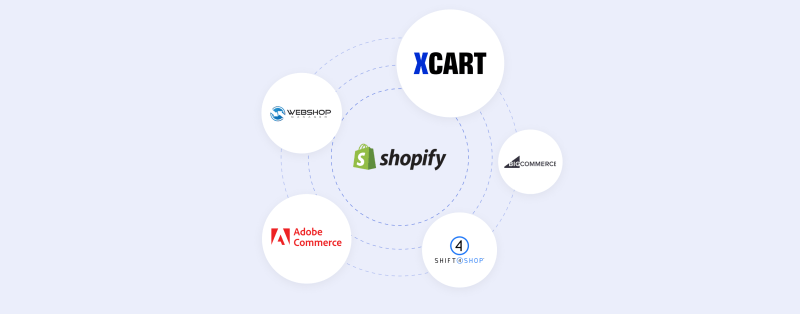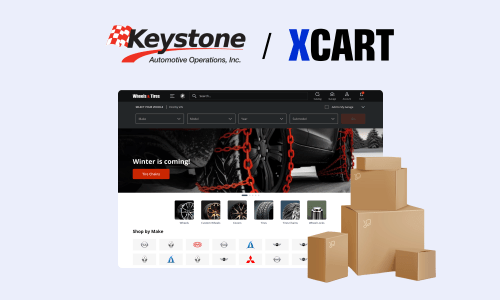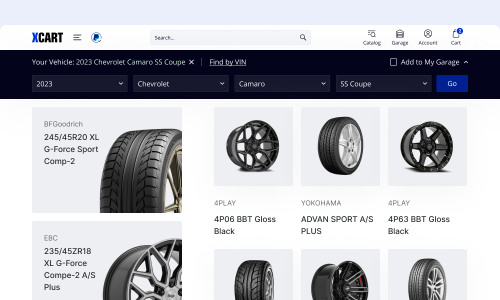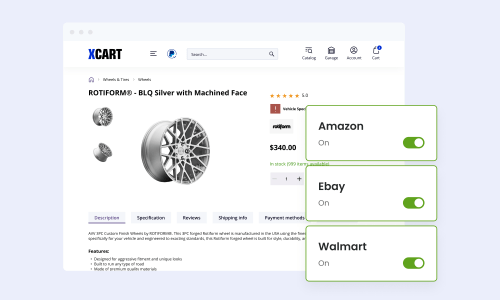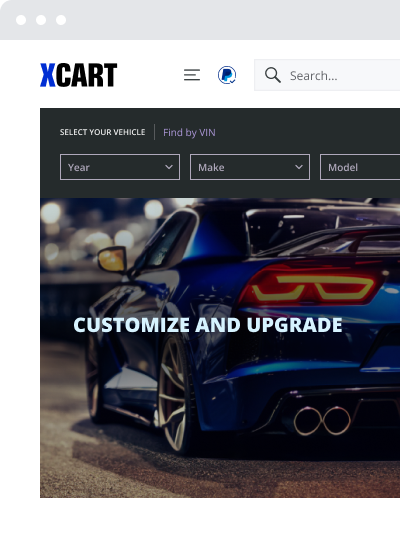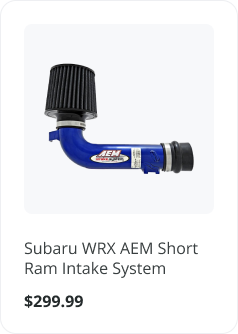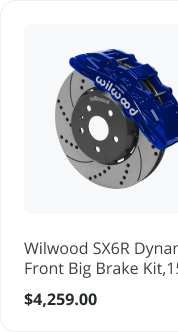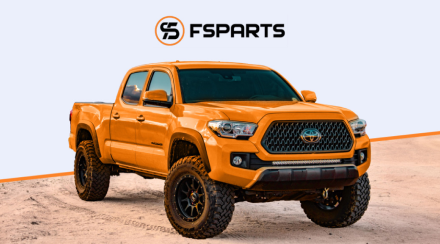5 Alternatives to Shopify: Opting for Software Laser-Focused on Automotive eCommerce

No one wants to spend hours in traffic or take the wrong turn and drive to a dead end. Likewise, you’d like to avoid your automotive business getting stuck on its way to growth and profitability. But what if the capabilities of your existing website are too limited to let you grow your product line, adjust your storefront design, or add new functionality?
For online businesses facing these challenges, two options are available: either customize their eCommerce platform despite the cost of ownership rising month by month or start looking for an alternative solution that offers greater flexibility with less time, effort, and money spent on maintenance.
Apparently, you’ll be looking for a solution that would add to your online business scalability, offering you and your customers the best value at a lower cost.
In this article, we’ve jotted down the list of automotive-focused shopping cart solutions for you to choose as an alternative to Shopify. We will also highlight these eCommerce platforms’ most crucial features and capabilities, weighing their pros and cons to help you select the option that suits you the best.
Why Not Shopify?
Shopify can be an excellent choice for start-ups and small businesses. Due to its SaaS-based architecture, low learning curve, and all the necessary eCommerce functionality available out of the box, it offers faster time-to-market compared to API-driven software.
Online merchants with higher levels of annual revenue can upgrade to the Shopify Plus eCommerce plan to get more advanced features and integrations, inventory management and marketing tools, and access Shopify’s dedicated customer support.
However, despite Shopify and Shopify Plus being popular eCommerce solutions, they may not be the most effective choices for retailers selling in niche markets, such as the automotive aftermarket industry. Custom integrations can be costly, and maintaining third-party add-ons can add up over time, significantly increasing the expenses.
Additionally, third-party payment processing fees can further increase the overall cost of using this eCommerce solution. This is why some online retailers may turn to Shopify competitors, looking for a more cost-effective and customizable solution that offers greater flexibility and functionality at a lower cost.
Top 5 Criteria Choosing the eCommerce Platform for Auto Parts Online Store
When choosing a new shopping cart solution for your auto parts online store, analyze its capabilities in the context of automotive eCommerce. According to the feedback we’ve got from online merchants who migrated to X-Cart, we’ve put together the top five features that auto parts business owners seek in Shopify alternatives.
1. Focus on the automotive aftermarket sector
Ensure the new platform aligns with the specifics of automotive eCommerce. This applies to complex catalog management, inventory synchronization across sales channels, compelling website design, and guaranteed parts compatibility for your customers’ convenience.
Even more important is the ability of the eCommerce platform to stay in the loop with the latest automotive trends, continually develop new features, add required integrations, and improve existing functionality.
2. Affordable customizations
Unlike cloud-based solutions that are hard to customize and get your website tailored to the unique needs of your automotive business, headless eCommerce platforms are much more flexible. API-driven software allows companies to launch new features and deliver superior user experiences while saving time and money.
3. Various payment methods
A smooth and seamless payment process puts customers at ease and encourages them to complete a purchase. By providing a variety of payment choices, Buy Now Pay Later plans, and contactless payment options, to name a few, you increase your chances for conversion and make your car parts buyers trust you more. This is why you need several integrations with secure payment processors and customer financing companies.
4. Direct partnerships with automotive eCommerce players
There’s nothing wrong with connecting your website to third-party apps. However, direct integrations can save you from the hassle of maintaining these add-ons and plugins and ensure your online store will run without a hitch.
5. Professional technical support
Behind any successful eCommerce business lies the proper software solution AND professional technical support to help you optimize your online store performance and resolve any issue promptly. Without a skilled team of experts ready to assist you 24/7, you risk losing sales, damaging your reputation, and falling behind your competitors.
5 Automotive-Focused Shopify Competitors
Based on the criteria mentioned above, we’ve analyzed the tools and features of the five eCommerce platforms: X-Cart, BigCommerce, WebShop Manager, Adobe Commerce, and Shift4Shop.
At X-Cart, we genuinely love our shopping cart solution and are 100% sure it has great capabilities for auto parts online businesses. However, we know that each online retail company is unique and has different goals (strategies to hit them also vary). This is why online sellers seek solutions that would answer their specific needs.
So, we’ve tried to be as impartial as possible while writing this comparison to help you find YOUR eCommerce platform.
Features Overview
| X-Cart | BigCommerce | WebShop Manager | Adobe Commerce | Shift4Shop | |
| API access | ✔ | ✔ | ❎ | ✔ | ✔ |
| Limitless SKUs | ✔ | ✔ | ✔ | ✔ | ✔ |
| Prebuilt real-time search functionality | ✔ | ❎ | ✔ | ❎ | ✔ |
| Native YMM filtering | ✔ | 3P | ✔ | 3P | 3P |
| VIN lookup | ✔ | 3P | ✔ | 3P | 3P |
| Automotive design themes | ✔ | ✔ | ✔ | ✔ | ✔ |
| Automated catalog management | ✔ | ❎ | ✔ | ❎ | ❎ |
| Partnerships with auto parts data providers | ✔ | 3P | ✔ | 3P | 3P |
| Integrations with automotive distributors | ✔ | 3P | 3P | 3P | 3P |
| Payment gateways | over 120 payment gateways | over 55 payment gateways | PayPal, Affirm, Authorize.net | PayPal, Braintree, Authorize.net, Venmo | Shift4 payment processor, PayPal |
| Payment processing fees | ❎ | ❎ | ❎ | ❎ | ❎ |
| Marketing tools | ✔ | ✔ | ✔ | ✔ | ✔ |
| SEO tools | ✔ | ✔ | ✔ | ✔ | ✔ |
| In-house development services | ✔ | ❎ | ✔ | ❎ | ❎ |
| Technical support | ✔ | ✔ | ✔ | ✔ | ✔ |
X-Cart
X-Cart Automotive is an API-driven eCommerce solution developed explicitly for online auto parts sellers. We’ve been continually improving our platform to meet the ever-evolving needs of automotive eCommerce and resolve its main challenges.
X-Cart provides automated massive data and inventory updates, adjustable customization options, and 24/7 top-notch customer support. These features and services are something that distinguish X-Cart from general-purpose eCommerce platforms, as Brandon Checketts mentioned in his interview with Website Planet.
X-Cart offers a number of features specifically designed to support high-volume e-commerce operations. These features provide scalability, reliability, and efficiency, which is critical for managing large transaction volumes and extensive product catalogs.
The Key Benefits of X-Cart Automotive:
Complex catalog and fitment data management
X-Cart’s user-friendly interface makes it easy for online business owners to add new products and categories and manage and update data in their eCommerce catalogs. You can connect your online store to the most trusted auto parts data suppliers, such as SEMA Data, ASAP Network, or AutoSync, to select and automatically import the preferred brands.
Furthermore, with the smart import settings, you may schedule data imports and select the time for regular catalog updates. And the category mapping feature will ease your headaches while structuring your complex data.
Order management and fulfillment
Choose between becoming an auto parts dealer or a drop shipper with the Turn 14 Distribution, Torqued Distribution integrations, and more coming soon. Synchronize your inventory across the warehouses to manage it from your X-Cart admin panel and streamline order fulfillment for an error-free shipping process.
Automotive website design and navigation
With X-Cart, you can also minimize inaccurate orders and increase customers’ trust with smart, intuitive website navigation and product search filtering. The prebuilt Year Make Model and VIN lookup fitment search tools easily integrate into the X-Cart automotive design skins, ensuring your customers will quickly and easily find the very part they were looking for. The ‘My Garage’ feature will also enable customers to save their vehicle’s filters for future parts searches.
BigCommerce
This shopping cart solution offers the essential eCommerce functionality out of the box and has pricing plans for businesses of all sizes. Although it was not initially built as automotive eCommerce software, it provides a range of third-party plugins for automotive retailers, such as the Year/Make/Model search tool and integrations with SEMA Data and Torqued distribution, to name a few.
This platform also claims to be flexible enough to customize your website to your needs and preferences. It doesn’t have an in-house development team. Instead, it offers several partnerships with developer agencies.
Outsourcing customizations to third-party agencies, however, has a drawback. You risk complicating your website’s maintenance, as you’ll have to shift to different teams for support if any issue arises. This may be why this platform recently got more negative feedback on customer support services on review websites.
Adobe Commerce
Adobe Commerce (ex Magento) is an eCommerce application that supports massive product catalogs and can be extended with customizations.
This eCommerce solution also allows for creating configurable, bundled, and grouped products, letting customers select from different variations or kits. This feature offers greater control over the product offerings and enhances the personalized shopping experience for car parts buyers.
It is worth mentioning that car parts fitment is not a native concept in Adobe Commerce. To get this feature, you will need to build a custom solution with a Magento-certified developer or agency to integrate your eCommerce store with ACES (Aftermarket Catalog Exchange Standard) fitment data or other data sources and power a Year Make Model lookup.
Although Adobe Commerce was not designed as a solution specifically built for auto parts eCommerce, it offers several third-party integrations. You can leverage Adobe Commerce’s extension marketplace or third-party apps to get the required automotive tools and features, such as shop-by-vehicle functionality.
WebShop Manager
WebShop Manager (WSM) is a SaaS eCommerce solution developed to help sellers in the automotive aftermarket sector. It offers essential functionality for online auto-parts merchants, including extensive eCommerce catalogs, the PartsLogic search tool, native Year Make Model filtering and product data management tools.
It also features several integrations with automotive databases, such as SEMA Data and ASAP Network. The only downside is that WebShop Manager has only a few ready-made integrations. As we mentioned above, the SaaS type of eCommerce platform keeps the users within the bounds of prebuilt tools, which means custom features or integrations can be rather complicated and expensive.
It is worth mentioning, however, that WSM has its own web development team to cover its customers’ needs for custom integrations. Still, it looks less versatile than API-driven eCommerce solutions.
Shift4Shop
This eCommerce platform offers a wide range of features and capabilities for online businesses, including those in the automotive industry. Shift4Shop provides a customizable online storefront that allows you to create a unique shopping experience for your customers, with options to add new functionality and features as your business grows. It also comes with built-in SEO tools, marketing integrations, and email marketing capabilities.
For automotive businesses, Shift4Shop offers third-party integrations to get the essential features, such as a VIN decoder, Year Make Model search, and compatibility checker, making it easy for customers to find the right vehicle parts. It also has a range of free themes designed for auto parts businesses.
It’s Up to You
While assessing the alternatives, some business owners rely mostly on word of mouth and a well-known brand name for an eCommerce solution. However, there’s a hitch! These website builders are designed to accommodate various business types and niches.
But the fact is that platforms developed with a cookie-cutter approach may not suit automotive eCommerce because they do not provide ready-made solutions for the automotive industry’s requirements, forcing businesses to compromise budgets and company goals.
Choosing an automotive-focused eCommerce platform saves you time, money, and effort and lets you focus on scaling your sales, not on the minutiae of maintenance tasks.
Choose the Right Technology for Rapid Business Growth

Maria is a marketing manager at X-Cart. Once captured by digital and content marketing in her student days, she keeps living and breathing it ever since.
